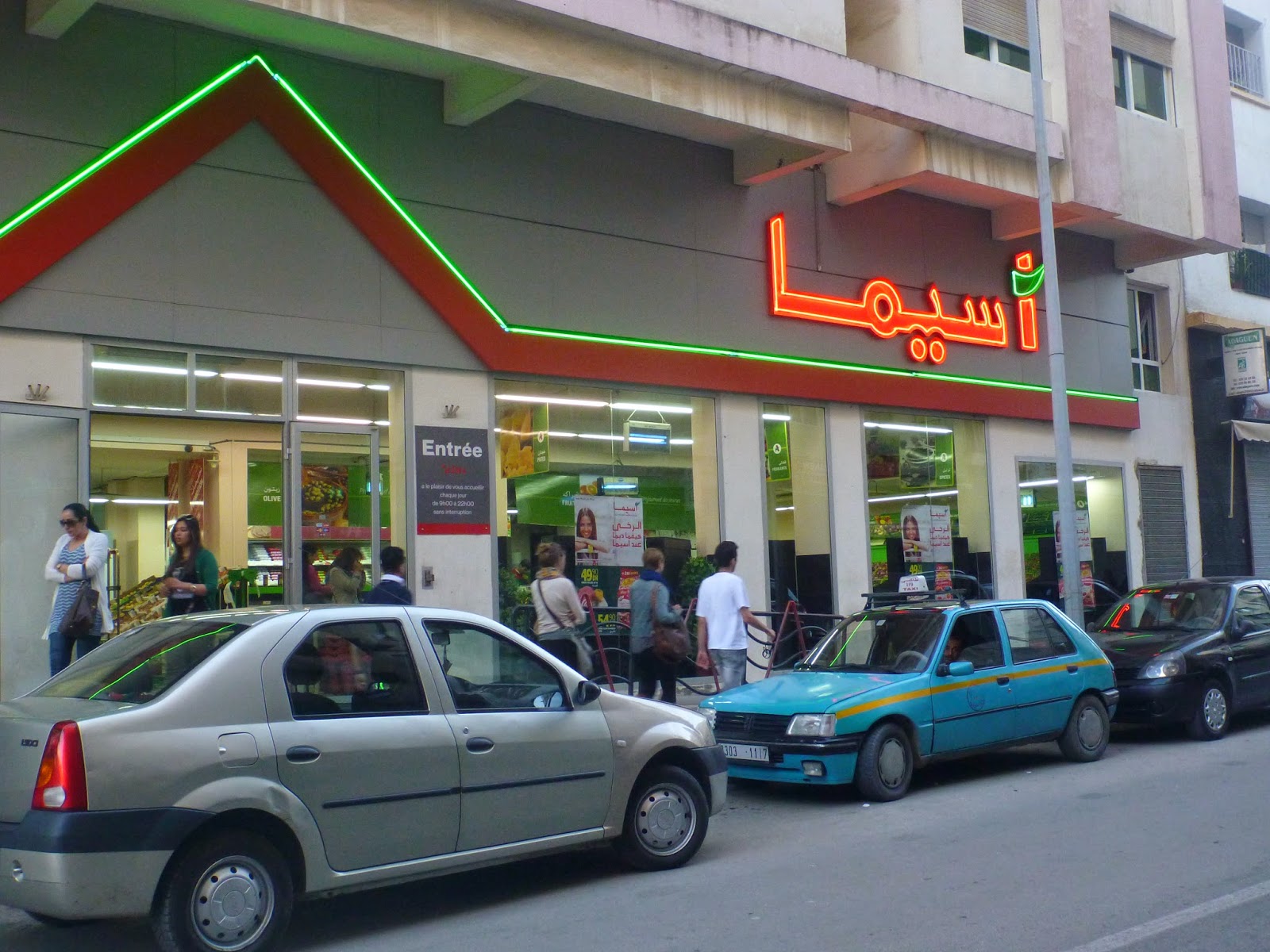Super Markets
Super markets are quickly becoming the norm for food
purchases in the developing world. In Tangier, western-style grocery stores
stock a wide variety of fresh and processed foods, imported brands, and
household and cleaning needs. Most have similar layouts to American chains,
with sections for fresh produce, milk, meat and fish, bakery, deli, dry goods,
and household supplies. The sizes vary: some independent neighborhood grocery
stores are relatively small, some Wal-Mart style super markets located on the
outskirts of the city are massive and offer consumer goods such as electronics
and sports equipment in addition to groceries. Regardless of the size, all
stores of this type are characterized by a formal price system, shopping carts
and cashier lanes, and Western-style layouts with tile floors and bright
lighting. However, many other types of shops and markets persist.
Alimentation General
Alimentation General
translates to “general food store.” These shops, found in every neighborhood,
are the go-to places for basic daily needs. They are relatively small and carry
mostly dry and canned goods, some processed and snack foods, oil, milk, fresh
bread, eggs, cheese, juice, usually some fresh fruits and vegetables. They also
have things like laundry detergent, dish soap, and shampoo. They are usually
less expensive than the supermarkets.
Central Covered Market
The large central market offers fresh fruit and vegetables,
meat, fish, eggs, cheese, and olives. There are dozens of vendors within a
large building, and each vendor usually offers a specific type of product:
either fruit or vegetables, olives, chicken and eggs, or beef. Cheese is mostly
sold by individual women with small informal stands within the market. Produce
and meet are usually less expensive than the supermarket, but not always.

Street Vendors
In addition to the central market, fresh local fruit,
vegetables, and cheese are also sold in less formal street stands, either on
wheeled tables, blankets, or out of vans or trucks. These vendors are always
less expensive than the supermarket and usually less expensive than the central
covered market as well.
Fruit sec
Known as fruit sec,
which means “dried fruit” in French, these small shops and stands sell mostly processed snack foods, chips, candy, and
cookies, as well as nuts and dried fruit. Most items cost less than a dollar,
and for 10-25¢ you can buy a small scoop of nuts or sunflower seeds wrapped in
a paper cone. You can find one on nearly every street, and on the busy main
boulevard, most blocks have two or three.
Laiterie/Milbana/Cremerie
These types of shops, known as a laiteries or cremeries (literally
milk store or creamery) in French and a milbanas
in Moroccan Arabic, sell a variety of quick, inexpensive, on the go meals and
snacks. The most common offerings are
sandwiches made with traditional Moroccan breads – hobz makalah, harcha, or erghraygef
– filled with fresh cheese, butter, hard-boiled eggs, mortadella, olive oil, or
nut butters. These types of sandwiches usually cost between 5 dirham (about
60¢) and 15 dirham. They also sometimes offer fresh juices and pastries, and
some have processed snacks and bottled juices as well.
Sandwich Shops
Somewhat similar to the Laiteries, sandwich shops sell quick
meals and snacks, mostly sandwiches made with eggs, chicken, liver, shrimp or
beef, topped with vegetables and French fries. Prices ranges from 10 dirham
(about $1.20) to 30 dirham.
They are very popular and quite tasty.
Bakery/Patisserie
There are many bakeries
in Tangier, offering fresh bread, cakes, cookies, and pastries. They are
multiple types - the largest kind is a western-style store with
at least a dozen varieties of fresh bread, both Moroccan styles and French
styles like baguettes. They will also offer many kind of cookies and pastries.
They vary in price but tend to be a little more expensive.
A second type of
bakery is the small street stand. These specialize in griddle-cooked Moroccan
breads such as erghaygef and harcha, and usually offer honey, cheese, nut butters,
and olive oil as accompaniments for a quick snack. Some offer soups or simple
fish dishes as well, which can be eaten while standing there or wrapped up to
go.
A third type of patisserie specializes in the popular deep-fried treats
that are popular here. They usually have some baked cookies as well, but the
focus is the huge platters of golden-brown swirls of dough, fried and then
soaked in a sugar-honey syrup.

Butchers
In some of the more residential areas,
you can find stand-alone butcher shops not connected to a larger market. These
tend to sell either beef or chicken, usually not both. Many also sell lamb or
mutton. They often sell fresh vegetables too, making them easy stops for all
the ingredients needed for home cooking.
Most of the meat arrives in large
pieces – whole sides of beef are delivered to the shop and displayed, being cut
and wrapped in paper as the customer purchases it rather than pre-cut and
displayed in plastic wrap. Chickens are often sold whole, although you can
easily find smaller pieces.
As pigs are haram - prohibited in Islam - it is
almost impossible to find fresh pork, although you can find processed ham at
import grocery stores.
Specialty vendors
– in addition to stores selling many types of food, there are stands and shops
that sell just specific items, such as dates or spices. These are mostly found
in the market district of the old city.
In addition to these types of markets and snack shops, there
are hundreds of simple cafés, serving little other than tea and coffee, upscale
cafés with full menus, and a wide range of sit-down restaurants.













No comments:
Post a Comment